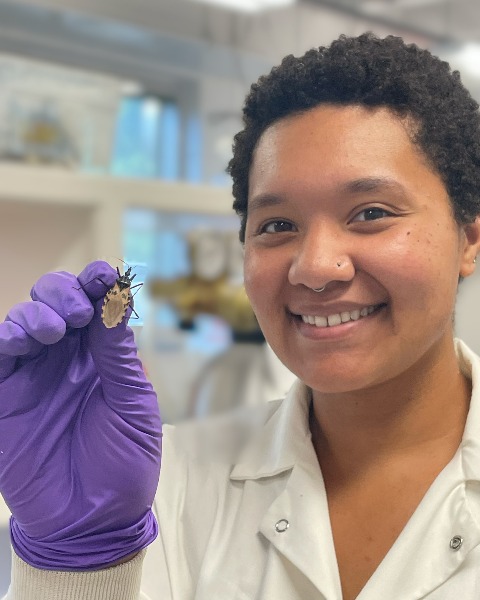Physiology, Biochemistry, and Toxicology
Poster
PBT: Biochemistry, Behavior, and Pathogenicity
D3223: Understanding the role of symbiont Rhodococcus rhodnii in kissing bug molting
Tuesday, November 15, 2022
9:00 AM - 6:30 PM PT
Location: West Exhibit Hall A

Nia I. Keyes-Scott
PhD Candidate
University of Georgia
Athens, Georgia
Presenting Author(s)
Bacterial symbionts are known to play an essential role in development and reproduction of many insect hosts, especially through promotion of host metabolism and nutrient provisioning. Axenic, or germ-free, insects exhibit nutrient deficiencies and inability to metabolize lipids and carbohydrates, which further impacts their ability to undergo normal development. Thus, axenic insects experience significantly longer developmental times or complete developmental arrest. In blood-feeding or hematophagous insects, symbionts are important for provisioning B vitamins, which are not believed to be highly abundant in vertebrate blood. These B vitamins are important cofactors for many metabolic pathways and are unable to be synthesized by animals. B vitamin provisioning was also thought to be the primary role of gut-symbiont Rhodococcus rhodnii in its kissing bug host, Rhodnius prolixus. To expand our knowledge of this key host-symbiont relationship, we sought to investigate the role of R. rhodnii in kissing bug lipid metabolism. We conducted a 1st instar gut transcriptome comparing axenic nymphs and nymphs singly inoculated with R. rhodnii (gnotobiotic) and identified 11 highly differentially expressed lipid metabolic genes, most of which were upregulated in gnotobiotic nymphs. Furthermore, we found that gnotobiotic 4th instar nymphs have significantly higher lipid stores than axenic bugs. Our findings demonstrate that R. rhodnii likely has additional roles in bugs outside of B vitamin provisioning.


